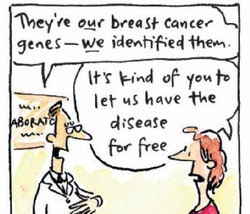|
Josh Barro, writing for businessinsider.com, recently made the claim that private health insurance is "a government benefit provided through public channels". At the risk of opening myself to political argument, I'd like to address his major point, which is that health insurance is not a typical insurance product, "designed to turn an individual's risk of loss into a predictable cost". I claim that it he is correct, but by changing the word "individual" to "group", changing the dimensionality of the insurance's target, he would be incorrect. Barro argues that sick people's benefits from health insurance exceed their monetized risk, and healthy people pay more than they actually expect to gain. This is a patently wrong conclusion: "broken" homes have "benefits" that exceed their homeowners monetized risk (homeowner's insurance policy), and "well-maintained" homes are on the opposite side of the spectrum. There just isn't a false equivalency here, as Barro explains it. So it is a bit striking that Barro is actually able to make his point well, because while, as he first explains it, health insurance is equivalent to homeowner's insurance, he accurately later points out that regulated health insurance: a kind of shadow fiscal policy, redistributing income from the healthy to the sick  Buzzwords aside, simple insurance (Barro's homeowner's insurance) is fundamentally a functional agreement which takes present risk and monetizes it over a long period of time: in other words it spreads risk across one dimension. Since my home's risk of, say, termite damage is (largely) has a relatively small spatial covariance with other homes, my contract with an insurer is one-dimensional. I give the insurer money, and they spread my risk over time for a small fee. In the health sphere, however, my personal risk of illness is considerably tied in to that around me. If you are not convinced, consider the rapid outbreak of swine flue, or peruse the wikipedia entry on epidemic, the common code, the flu, etc, etc... Not only do I encounter risk in terms of random fluctuations in my health over time, but also in the random interactions between myself and others. Health insurance requires a spreading of risk over two-dimensions, across time and between people. It is for this reason why, for health insurance to mean anything, it must be imposed on a supra-individual level, such as at the national level. Because any one person's engagement in a health insurance scheme is an implicit contracted two-dimensional spreading of risk, they are effectively losing their insurance when other individuals fail to enroll.
Capital-h Health, not health insurance, is what is not a toaster, and so to insure it is to contract in a two-dimensional relationship between individuals and with an insurer. Barro is (almost) right. Alex Tabarrok at Marginal Revolution has a more nuanced take on the SCOTUS decision from yesterday: You might think that the law draws a bright line between discoveries which cannot be patented and inventions which can but that’s not correct. Discoveries can be patented and the ruling goes out of its way to push back against the view that they can’t. The ruling correctly notes that a “considerable danger” is that patents on basic ideas and tools would “inhibit future innovation”. Yet the law makes no mention of these considerations and the court provides no guidance on implementation. Its important to look on the different conceptions of "discovery" here. The way I see it, there are two types of discovery:
 The metaphysical discoveries (say what you want about Platonic ideals) do not exist on their own. They exist only as a byproduct of careful thought, and are essentially developed ideas and frameworks for forming ideas. Many of the metaphysical "discoveries" made by humans over the previous thousands of years have been lost to current science, mostly because they are of no real use to humanity and do not relate to any new physical discovery. Take a silly example: Fred discovers a new novel way of making fried cups of onion. In two years it may be forgotten, and nobody but Fred may ever rediscover the method. If Fred has his memory wiped Men-in-Black style, he'll be able to find out what an onion is, even if he can't fry them just so. It is clear to me that physical discoveries should not be patentable, since there is nothing special about them once found. To patent something which you cannot exercise any true ownership over is impossible (there is much to say here about piracy and software patents). But there are real concerns about the discovery of ideas: the construction of a new model train should be patentable, because this is a developed strategy, wholly constructed and unique to its creator. But should the proof of the Lonely Runner Conjecture be patentable? What if it is a constructivist proof (though it can't be :) )? In my view, something which is patentable should be so because it at minimum involves the genesis of something. Which is why I think Tabarrok has it all wrong when he says: The ruling, for example, says that a firm can’t patent a gene that it discovers but it can patent the cDNA that it develops. It’s the discovery, however, that’s expensive. The development of cDNA is today a trivial step. Thus, you can patent the trivial step but not the giant leap. While we have made a "giant leap" forward in our understanding the world, we didn't create anything new when BRCA was found, merely observed the gene. There has been no giant leap forward in the world, just in what we as humanity know about it. The fact that a gene codes for proteins which act out some role in human biology is true whether we know it or not. So which it may seem less of a leap to understand the development of cDNA for BRCA, it is the only actual "leap" (as it applies to metaphysical discovery) here.
|
AuthorOceanographer, Mathemagician, and Interested Party Archives
March 2017
Categories
All
|
 RSS Feed
RSS Feed
